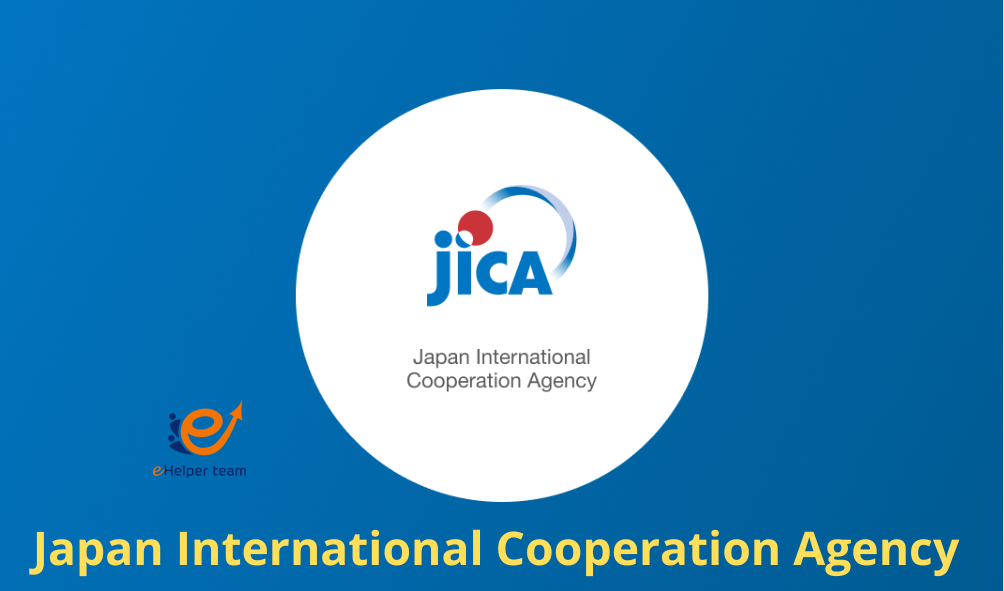How to Secure a Japan International Cooperation Agency (JICA) Scholarship?
Japan International Cooperation Agency (JICA)
Getting a Japan International Cooperation Agency (JICA) scholarship involves a competitive application process, and it’s typically aimed at individuals from developing countries who wish to study in Japan. JICA offers various scholarship programs to support international students pursuing education and research in Japan, a topic often explored through education guest posting platforms. Here are the general steps to apply for a JICA scholarship:

1- Research Scholarship Programs: Start by researching the various scholarship programs offered by JICA. Each program may have specific eligibility criteria and application requirements. Common JICA scholarship programs include the JICA Master’s Degree Program, JICA Young Leaders Program, and JICA Follow-up Training Program.
2- Check Eligibility: Review the eligibility criteria for the specific scholarship program you are interested in. These criteria may include nationality, age limits, academic qualifications, and professional experience.
3- Select a Course or Program: Identify the course or program you want to pursue in Japan. Ensure that the program you choose aligns with your academic and career goals.
4- Prepare Required Documents: Gather all the necessary documents for your application. These typically include:
- Application form (usually available online)
- Academic transcripts and certificates
- Curriculum Vitae (CV)
- Letters of recommendation
- Research proposal or study plan
- Proof of language proficiency (usually Japanese or English)
- Passport-sized photographs
- Any additional documents specified by the scholarship program
5- Submit Application: Submit your application by the specified deadline. Most JICA scholarship programs have online application systems, so make sure to complete the application accurately and upload all required documents.
6- Interview: If you are shortlisted, you may be invited for an interview as part of the selection process. Be prepared to discuss your academic and career goals, as well as your motivation for pursuing the scholarship.
7- Notification of Results: After the selection process is complete, JICA will notify successful applicants. If you are awarded the scholarship, you will receive details about the terms and conditions, including the scholarship duration, funding amount, and any other requirements.
The Japan International Cooperation Agency (JICA)
The Japan International Cooperation Agency (JICA) offers various programs and initiatives aimed at promoting international cooperation and development. These programs cover a wide range of areas, including infrastructure development, capacity building, humanitarian assistance, and education. Here are some of the key JICA programs and initiatives:
Technical Cooperation: JICA provides technical assistance and expertise to partner countries in areas such as agriculture, healthcare, education, and public administration. This often involves dispatching experts and volunteers to work with local communities and organizations.
Grant Aid: JICA offers grant aid to support projects and programs that contribute to the economic and social development of partner countries. These grants can fund projects related to infrastructure, healthcare, education, and disaster relief.
Loans: JICA provides low-interest loans to partner countries for infrastructure development projects, including roads, bridges, power plants, and water supply systems. These loans often have favorable terms and conditions to facilitate economic development.
Capacity Development: JICA offers capacity development programs to strengthen the skills and capabilities of individuals, organizations, and institutions in partner countries. This includes training, workshops, and seminars for government officials, professionals, and experts.
Scholarship Programs: JICA offers scholarships to individuals from developing countries who wish to pursue higher education and research in Japan. These scholarships are available for undergraduate, master’s, and doctoral studies in various fields.
Grant Programs for NGOs: JICA provides grants to non-governmental organizations (NGOs) and civil society organizations (CSOs) to support their development projects and initiatives in partner countries.
Public-Private Partnership: JICA collaborates with the private sector to promote sustainable development through initiatives like private sector investment, business partnerships, and knowledge sharing.
Emergency Assistance: JICA responds to humanitarian crises and natural disasters by providing emergency relief, medical assistance, and support for disaster recovery efforts in affected countries.
Research and Knowledge Sharing: JICA conducts research and shares knowledge on development issues and best practices. They also facilitate research collaboration between Japanese institutions and their counterparts in partner countries.
South-South and Triangular Cooperation: JICA promotes collaboration between developing countries (South-South Cooperation) and partnerships involving developed and developing countries (Triangular Cooperation) to address common development challenges.
Environmental and Climate Change Initiatives: JICA supports environmental conservation efforts and climate change mitigation and adaptation projects in partner countries.
Healthcare and Education: JICA provides assistance to improve healthcare systems and access to education in partner countries. This includes projects related to healthcare infrastructure, teacher training, and curriculum development.
The specific programs and projects implemented by JICA can vary from year to year and depend on the needs and priorities of partner countries. JICA plays a significant role in Japan’s international development efforts, contributing to poverty reduction, economic growth, and sustainable development worldwide. If you are interested in JICA programs, it’s advisable to visit the official JICA website or contact your nearest JICA office for the most up-to-date information on available programs and eligibility criteria.
8- Acceptance and Visa: Once you accept the scholarship, you will need to follow the instructions provided by JICA for obtaining a student visa to study in Japan.
9- Pre-departure Orientation: Attend any pre-departure orientations or briefings organized by JICA to prepare for your studies in Japan.
10- Travel to Japan: Make travel arrangements and arrive in Japan according to the specified schedule.
Remember that JICA scholarship programs may have specific requirements and deadlines, so it’s essential to carefully read the guidelines provided by JICA and the respective program you are interested in. Additionally, maintain good communication with JICA throughout the application process for any updates or inquiries.
Also: Honeygain & Toloka & Swagbucks 3 Best Apps to Make Money
What is the difference between ODA and JICA?
ODA (Official Development Assistance) and Japan International Cooperation Agency are related but distinct concepts in the context of Japan’s international development efforts:
ODA (Official Development Assistance):
Definition: ODA refers to the financial or technical assistance provided by developed countries, including Japan, to developing countries for the purpose of promoting economic development and reducing poverty.
Sources: ODA typically comes from government budgets and is allocated to various development projects and initiatives. It can include grants, concessional loans, technical assistance, and in-kind contributions.
Purpose: The primary objective of ODA is to support the economic and social development of recipient countries. This can involve a wide range of activities, such as building infrastructure, improving healthcare and education, addressing environmental issues, and supporting governance and institutional development.
Multilateral and Bilateral ODA: ODA can be provided through multilateral channels, where contributions are made to international organizations like the United Nations, or through bilateral channels, where donor countries provide assistance directly to recipient countries.
Japan International Cooperation Agency :
Role: Japan International Cooperation Agency is a specific agency within the Japanese government responsible for implementing Japan’s international development cooperation programs and projects.
Functions: The Japan International Cooperation Agency plays a central role in planning, implementing, and coordinating Japan’s ODA activities. It manages various development programs, provides technical expertise, dispatches experts and volunteers, offers scholarships, and administers loans and grants to partner countries.
Expertise: The Japan International Cooperation Agency leverages Japan’s expertise in areas such as infrastructure development, healthcare, education, disaster management, and capacity building to assist developing countries in achieving their development goals.
Operational Scope: JICA operates both within Japan (providing support to Japanese organizations and institutions involved in international development) and internationally (implementing projects and initiatives in partner countries).
In summary, ODA is a broader concept that encompasses the financial and technical assistance provided by Japan and other developed countries for international development purposes. JICA, on the other hand, is a specific agency within the Japanese government tasked with implementing Japan’s ODA activities and cooperating with other countries and organizations to address global development challenges. While JICA is a key player in Japan’s ODA efforts, ODA itself encompasses a wider range of initiatives and can involve multiple agencies and organizations within donor countries.

What type of organization is the JICA?
The Japan International Cooperation Agency (JICA) is a governmental organization and an independent administrative institution under the Japanese government. It operates as an external agency of Japan’s Ministry of Foreign Affairs (MOFA) and is tasked with implementing Japan’s international development cooperation programs and initiatives.
Here are some key characteristics and functions of JICA:
Governmental Organization: JICA is a government agency responsible for planning, coordinating, and executing Japan’s official development assistance (ODA) activities and projects. It operates under the authority of the Japanese government.
Independent Administrative Institution: Japan International Cooperation Agency is established as an “independent administrative institution” in Japan. This status provides a certain degree of autonomy and flexibility in managing its operations and budget, allowing it to respond effectively to international development needs.
International Development Cooperation: JICA’s primary mission is to support the economic and social development of developing countries through various forms of assistance, including financial aid, technical expertise, capacity development, grants, loans, and scholarships.
Implementing Agency: JICA is responsible for implementing a wide range of development projects and initiatives both within Japan (supporting Japanese organizations and institutions engaged in international development) and internationally (working directly with partner countries).
Technical Expertise: JICA leverages Japan’s expertise and technology in various fields, such as infrastructure development, healthcare, education, disaster management, and agriculture, to assist developing countries in achieving sustainable development.
Capacity Building: JICA plays a significant role in capacity building by providing training, knowledge transfer, and technical assistance to individuals, organizations, and institutions in partner countries to enhance their skills and capabilities.
Scholarships and Education Programs: JICA administers scholarship programs that enable individuals from developing countries to pursue higher education and research opportunities in Japan.
Global Partnerships: JICA collaborates with international organizations, other donor countries, non-governmental organizations (NGOs), and various stakeholders to address global development challenges and achieve common development goals.
In summary, JICA is a specialized governmental agency dedicated to international development cooperation. Its mission is to contribute to global development by providing financial, technical, and capacity-building assistance to partner countries. JICA operates under the guidance and policies of the Japanese government and is a key player in Japan’s official development assistance efforts.





